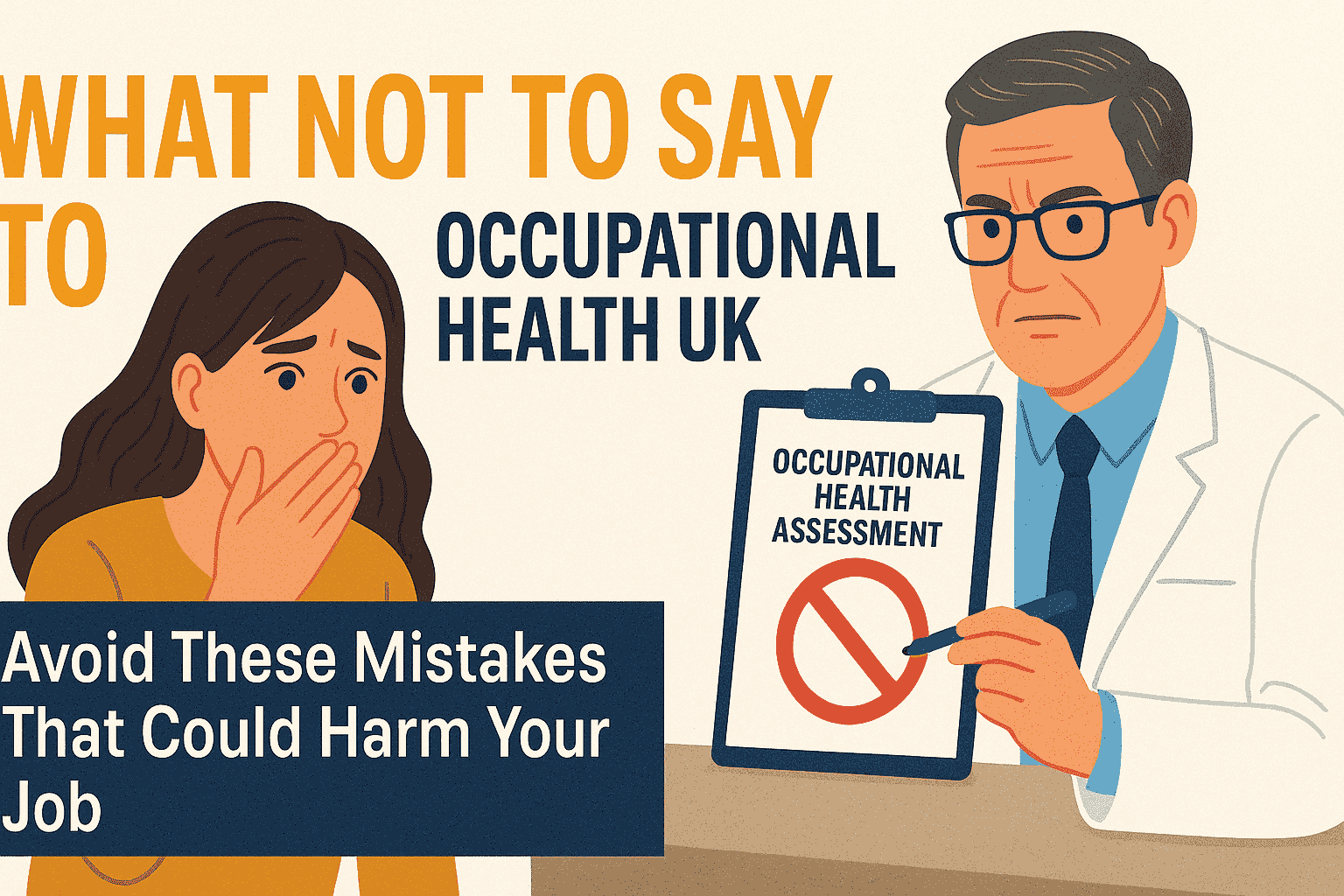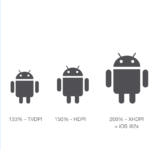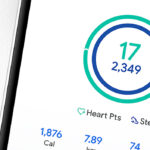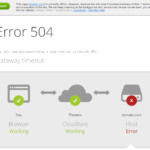If you’re preparing for a workplace health assessment, you might be wondering what not to say to occupational health UK professionals during your appointment. It’s a fair concern—these conversations can feel awkward or even intimidating, especially when you’re unsure how much to share or what might be used against you later. In this blog post, we’ll walk you through what occupational health is, how it works in the UK, and most importantly, the common mistakes people make by saying the wrong thing. Think of this as your go-to survival guide for navigating occupational health assessments with confidence and clarity.
What Is Occupational Health in the UK?
Let’s start with the basics. Occupational health (OH) is a confidential medical service provided by employers to assess how your health affects your work and vice versa. It’s not there to punish or terminate you, contrary to popular belief. In fact, OH professionals are medically trained, neutral experts who focus on helping both employees and employers create a safe, productive working environment.
They might assess you if:
You’ve been off sick for an extended period
You’re experiencing mental health struggles or workplace stress
You’re returning to work after surgery or a serious illness
Your manager needs advice on reasonable adjustments
The goal? To ensure your health is supported in the workplace while helping your employer meet their legal obligations under laws like the Equality Act 2010.
Why It Matters What You Say to Occupational Health
Let’s be clear: everything you say during an OH assessment can influence the report your employer receives. While these reports are medically confidential, they do inform important HR decisions—such as return-to-work plans, job role modifications, or even termination (in worst-case scenarios).
That’s why knowing what not to say to occupational health UK specialists is just as important as knowing what to say.
Misstatements, exaggerations, or dismissive comments can:
Undermine your credibility
Delay accommodations
Jeopardize legal protections
Lead to disciplinary actions
The assessment isn’t a courtroom, but it is an important record. Treat it with the same seriousness.
What Not to Say to Occupational Health UK: Top 12 Mistakes
Here are the most common blunders people make during occupational health assessments in the UK—and what to say instead.
1. “I’m absolutely fine.”
Why it’s a mistake: Saying you’re completely fine when you’re clearly struggling can work against you. Occupational health can only help if they understand the full picture.
Better alternative:
“I’ve been doing my best to cope, but I’m still having some issues with [specific concern]. I want to explore how I can manage better at work.”
2. “It’s none of your business.”
Why it’s a mistake: While OH isn’t there to dig into irrelevant personal issues, they do need honest answers to assess your fitness for work. Being hostile shuts down productive conversation.
Better alternative:
“I’d prefer not to share certain personal details, but I’m happy to discuss how my health is affecting my job.”
3. “My manager is an idiot.”
Why it’s a mistake: Personal attacks don’t help your case and can come across as unprofessional or emotionally unstable.
Better alternative:
“I’ve been finding communication with my manager challenging, and it’s been adding to my stress.”
4. “I’ll just quit if they don’t help me.”
Why it’s a mistake: Making ultimatums may be interpreted as unwillingness to engage or cooperate, which can harm future HR decisions.
Better alternative:
“I really want to return to work, but I need support and a clear plan to do so safely.”
5. “I’m not taking any meds, even if they help.”
Why it’s a mistake: While it’s your right to refuse treatment, sounding completely dismissive of medical advice may raise questions about how well you’re managing your condition.
Better alternative:
“I’m still exploring treatment options and want to understand what works best for me.”
6. “This is all my employer’s fault.”
Why it’s a mistake: Shifting full blame without taking any responsibility can seem defensive. It may also suggest you’re not open to solutions.
Better alternative:
“There have been workplace factors contributing to my health issues, and I’d like to work toward positive changes.”
7. “I don’t need any adjustments.”
Why it’s a mistake: You might think you’re making things easier for your employer, but you’re also forfeiting valuable support that can protect your health and job.
Better alternative:
“I’m not sure what adjustments I need yet, but I’m open to exploring what might help.”
8. “I don’t trust this process.”
Why it’s a mistake: It’s okay to feel wary, but expressing outright distrust can derail the conversation.
Better alternative:
“I’ve never been through this before, so I’d appreciate a bit more clarity about what happens next.”
9. “I want a different job, not this one.”
Why it’s a mistake: While your long-term goals may be different, saying this could signal disengagement or an inability to return to your current role.
Better alternative:
“I’m finding parts of my role difficult right now, and I’d like support to make it more manageable.”
10. “I’m not coming back—ever.”
Why it’s a mistake: Making absolute statements can close off options. If you later change your mind, this statement could work against you.
Better alternative:
“I’m unsure about my timeline for returning, but I’d like to keep the door open depending on how I recover.”
11. “I Googled my symptoms, and I’m sure I have…”
Why it’s a mistake: Self-diagnosing makes it hard for medical professionals to take you seriously. It could weaken your credibility.
Better alternative:
“I’ve noticed symptoms like [list them], and I’m waiting to see a specialist for a formal diagnosis.”
12. “I’m only here because HR made me.”
Why it’s a mistake: Saying this may suggest you’re not invested in your recovery or in finding solutions.
Better alternative:
“I was referred by HR, and I’d like to understand how this assessment can help support my situation.”
Tips for Saying the Right Things Instead
Now that you know what not to say to occupational health UK assessors, here’s how to approach the conversation constructively:
✅ Be Honest, but Thoughtful
Stick to facts about your health and how they impact your work. Be transparent, but avoid emotional outbursts.
✅ Prepare Notes Beforehand
Make a list of:
Symptoms you’re experiencing
Any diagnoses you’ve received
How your condition affects your daily tasks
What support you think could help
✅ Bring Documentation
If you have letters from your GP, hospital consultants, or therapists, bring them along. This adds legitimacy to your statements.
✅ Ask Questions
Engage with the process! Ask what recommendations they might make or how their report will be used.
✅ Follow Up in Writing
After the meeting, consider requesting a copy of the report or sending a brief thank-you note clarifying key points. It shows professionalism.
Frequently Asked Questions
❓Can Occupational Health Get Me Fired?
No—OH does not have firing power. They only make medical recommendations. It’s up to HR to decide on actions based on those recommendations.
❓Is the Occupational Health Report Confidential?
Mostly, yes. However, a summary report will be shared with your employer. You usually get to see and agree to the report before it’s sent.
❓Can I Refuse to Attend Occupational Health?
You can, but it may affect your rights—especially if you’re asking for reasonable adjustments. Declining could also raise red flags with HR.
Final Thoughts: What Not to Say to Occupational Health UK
Navigating an occupational health appointment can feel daunting, especially when you’re dealing with physical or mental health challenges. But remember—OH is there to help. By knowing what not to say to occupational health UK professionals, you avoid misunderstandings and protect your rights.
Keep it respectful, stick to facts, and communicate your needs clearly. You don’t have to be perfect—you just need to be prepared. And that preparation starts with knowing what not to say.
















Leave a Review